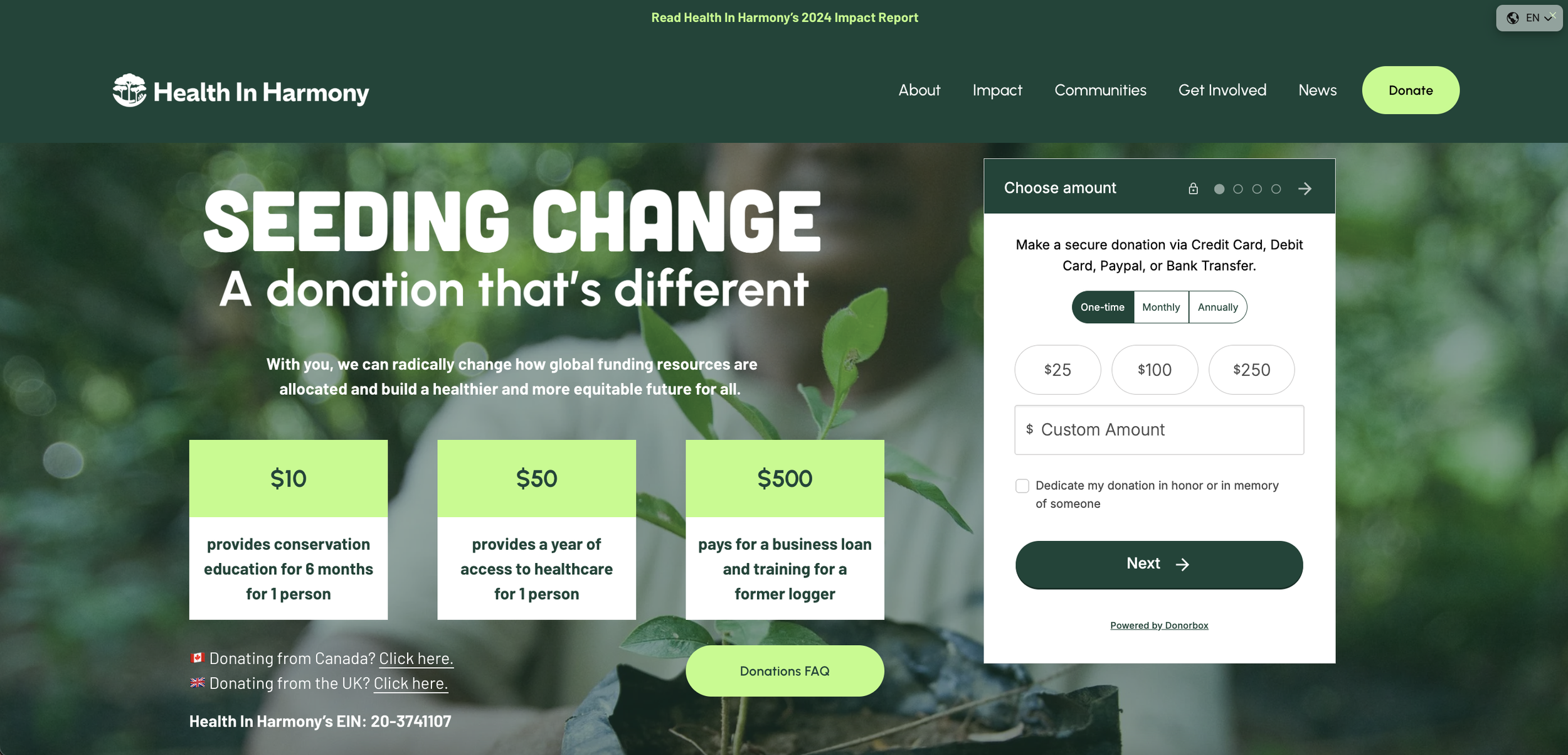WordPress vs. Squarespace: What’s the Best Choice for Your Website?
Written by Yasmeen Dahiya
Photo by Nathana Rebouças
Earlier this year, we decided it was time to rebuild our website. We were expanding our service offerings, welcomed new team members, and underwent a rebrand—meaning our existing website no longer met our needs.
While it’s true that we’ve helped dozens of science-focused and mission-driven organizations translate their work into digital experiences that connect, when it came to doing it for ourselves, we hit the same wall many of our clients do—varied opinions, a tight timeline, and not enough coffee.
To choose a platform for our website, we knew we had to think beyond the launch. We needed something that could meet our needs today and support our growth tomorrow. Our goal was simple: to build a site that was clear, purposeful, and ready to evolve with our work.
Ultimately, we chose Squarespace for our own website, but many of the sites we build for clients run on WordPress. At Boman Communications, we don’t believe in a one-size-fits-all platform. Instead, we help you choose the right tools based on your needs.
Whether you're building a website from scratch or giving your current site a refresh, this guide walks you through the key trade-offs between Squarespace and WordPress, so you feel confident to make an informed choice.
Fun fact: WordPress powers about 43% of all websites globally (W3Techs) and 66% of Squarespace users are small businesses (Higo Creative).
Photo by Stephen Phillips
Price and Total Cost
WordPress
Think of WordPress like an à la carte menu. You’ll need to budget for hosting, a domain, and potentially premium themes or plugins. Hosting plans start as low as $2.95/month, but they often renew at higher rates after the initial discount period. While Wordpress offers its own hosting plans starting at $25/month, many clients opt for external providers like Bluehost or Hostinger, which tend to be more affordable.
Squarespace
Squarespace works more like a fixed-price bundle. Plans range from $16–$99/month, with hosting, SSL, updates, analytics, and basic e-commerce built in. Add-ons like email marketing are available at an extra cost. (See Squarespace pricing).
Bottom line
Squarespace is easier to budget for, thanks to its all-in-one structure, though advanced plans can get pricey. WordPress gives you more control over your monthly costs and customization, but requires more hands-on management.
Flexibility
WordPress
If you need your website to go beyond the basics, WordPress has the depth to support complex features and growth. It’s open-source and extensible, with more than 60,000 free plugins in the official directory. Whether you need research repositories, member portals, or custom post types for grant programs, WordPress has the structure and the developer ecosystem to support it.
Squarespace
Squarespace is streamlined by design. It offers forms, blog tools, and beautiful templates. This makes it easy to build a website with consistent styling, however, you may come across frustrating limitations when it comes to highly customized workflows or niche integrations.
Bottom line
WordPress is ideal when your site needs to do more. Squarespace is great when you need a clean, fast, functional site that looks polished without custom coding.
Photo by Daniel Thomas
Maintenance
WordPress
Maintaining a WordPress site takes some ongoing care. You’ll need to update the core software, theme, and plugins regularly, run backups, and monitor for bugs or performance issues. Managed hosting providers like SiteGround or WP Engine help reduce that burden, but the responsibility still falls on you or your web team.
Squarespace
Squarespace handles everything behind the scenes—hosting, updates, security, and backups—so you don’t have to worry about technical maintenance or plugin conflicts.
Bottom line
Squarespace is practically maintenance free. WordPress requires ongoing care but gives you more flexibility, functionality, and room to scale as your needs grow.
Security
WordPress
WordPress can be very secure, if you manage it well. That means using strong passwords, installing reputable plugins, keeping everything updated, and layering on tools like Cloudflare and Wordfence. We generally recommend setting up advanced security measures like two-factor authentication.
Squarespace
Squarespace handles security behind the scenes. There’s no need to install security plugins or worry about vulnerabilities in third-party tools.
Bottom line
Both can be secure. Squarespace reduces your risk of human error, but Wordpress can be manageable with the right plugins and integrations.
Donation page of Health in Harmony website designed by Yasmeen Dahiya in Squarespace
E-commerce and Donations
WordPress
With WooCommerce, Easy Digital Downloads, or even a custom Stripe setup, WordPress supports complex donation flows, membership models, and product catalogs. If your org needs restricted content, donor segmentation, or CRM integrations, WordPress is often the better fit. It also integrates easily with Donorbox, GiveWP, and other nonprofit tools.
Squarespace
Squarespace works well for straightforward online stores and donation pages. It supports Stripe, PayPal, and Apple Pay, and includes polished features like abandoned cart recovery. However, it offers limited flexibility for things like multicurrency support or advanced product logic. Transaction fees may apply on lower-tier plans, so costs can add up depending on your setup.
Bottom line
If you need advanced commerce features, WordPress wins. If your store is simple and you don’t want to have to worry about other integrations, Squarespace is a solid choice.
Integrations
WordPress
Whether you're connecting to Salesforce, Mailchimp, Airtable, or a custom API, WordPress likely has a plugin or a developer who can build one. That makes it a strong choice for science teams that rely on complex data systems, CRMs, or internal dashboards.
Squarespace
You’ll find native integrations with tools like Mailchimp, Google Analytics, and Acuity Scheduling. For more complex needs, you’ll likely need Zapier, code snippets, or third-party embeds. Squarespace analytics can be limited and unreliable. Most teams we work with prefer to install Google Analytics for more accurate reporting.
Bottom line
For organizations with a growing tech stack, WordPress provides more extensibility. Squarespace handles the basics.
Photo by Brian Abugg
Editor Experience and Learning Curve
WordPress
Editor experience varies. The default block editor (Gutenberg) is improving, but many teams opt for visual builders like Elementor, Divi, or Beaver Builder. These tools add layout flexibility, but they come with a steeper learning curve and require additional plugins.
Squarespace
The Fluid Engine editor makes page editing easy and visual. No code is required. You can rearrange sections, preview mobile, and update your content with confidence.
Bottom line
Squarespace is easier for beginners. WordPress is better if you need full control and are willing to learn.
Mobile Design
WordPress
Most modern WordPress themes are responsive and mobile-friendly by default. Page builders give you tools to adjust layout and spacing per device, or even hide blocks on smaller screens.
Squarespace
Fluid Engine is responsive, but you have less control over mobile-specific views. You can’t hide content per device without custom code, and responsive previews may need extra tweaking.
Bottom line
Both platforms support strong mobile design. WordPress offers more precise control over how your site appears on different devices and often requires less manual tweaking to get it right.
Photo by Kenny Eliason
SEO and Performance
WordPress
With tools like Yoast SEO and Rank Math, you can control every SEO setting—from schema to sitemaps. That said, your performance will also depend on hosting, theme quality, and plugin choices. A fast, clean WordPress build will perform exceptionally well.
Squarespace
Squarespace covers the basics: automatic sitemaps, mobile-friendly templates, SSL, and editable meta descriptions. It’s great for content-based websites. However, you can’t customize technical SEO settings as deeply as you can on WordPress.
Bottom line
WordPress is ideal for advanced SEO. Squarespace covers most needs out of the box.
Photo by JP Lockwood
How We Help Clients Choose
We always come back to three simple questions:
What does your website need to do, both now and in 3 years? List your must-haves: publish a report, enroll participants, accept donations, or integrate with a CRM. Think beyond the launch.
Who will update it? If you don’t have a designer or developer on hand, ease of editing matters.
What’s your appetite for maintenance? Squarespace is low lift. WordPress offers more freedom and customization, if someone can manage it.
Fun fact: The average website lifespan is 2 years and 7 months. (AFP Global)
Still not sure? Build a test homepage in both. Upload a photo. Edit some text. Which one feels better for your team?
Want an Outside Opinion?
We help science and mission-driven organizations choose platforms and build websites that match their real-world workflows, not just tech specs. We’ve built sites for educators, DEI consultants, and climate nonprofits with layered audiences and complex stories to tell.
If you’re planning a new website or rethinking your current one, we’re happy to offer a free consultation, no strings attached.
Contact us to get started.








